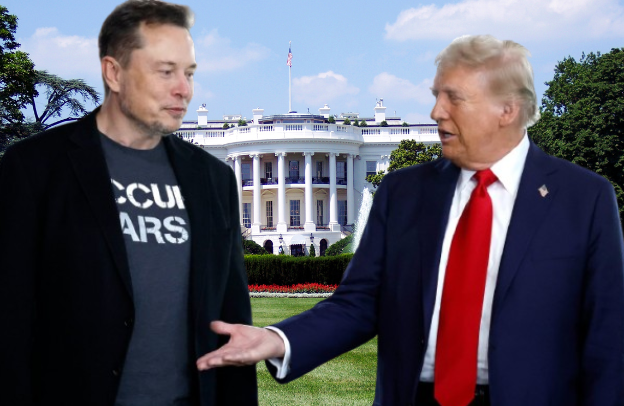Tesla Reaches $1 Trillion Market Cap as Musk’s Net Worth Surges to $300 Billion Following Trump’s Election Win

Tesla’s market value soared past $1 trillion for the first time since early 2022. This is fueled by a massive rally in its stock, following Elon Musk’s backing of Donald Trump, who secured a second presidential term. This surge in Tesla shares has propelled Musk’s net worth to over $300 billion, marking a significant milestone in his wealth.
Want to learn more about storytelling? Start by downloading the first chapter of The Storytelling Mastery.
According to Reuters, Tesla’s market value surged past $1 trillion on Friday, driven by a sharp rally fueled by optimism that CEO Elon Musk’s companies will receive favorable treatment under President-elect Donald Trump.
This boost comes in the wake of Musk’s strong support for Trump during the election campaign.
Tesla’s Market Value and Musk’s Wealth Surge
Shares of Tesla surged by more than 10% to nearly $330 per share during midday trading on Friday, before settling at $321, marking an 8% gain for the day. This uptick is part of a broader rally that has seen Tesla’s stock rise by 28% over the past three days, leading the charge in broader stock market gains after Trump’s victory.
There is no doubt that Elon Musk, a very smart businessman is playing a perfect game in a perfectly timely situation.
According to a report from The Economic Times, Tesla is reaping the benefits of Donald Trump’s election victory. The electric automaker’s market value surged past the $1 trillion mark in a sharp rally on Friday, fueled by growing speculation that CEO Elon Musk’s companies will receive favorable treatment in exchange for his strong support during Trump’s campaign.
Tesla’s stock jumped more than 6%, hitting a two-year high of $315.56, following a 19.3% increase up to Thursday’s close. This marks the first time in over two years that Tesla has reached a $1 trillion valuation.
See also The Anatomy Of Tesla’s Storytelling Strategy: The Secret Behind The Success
As a result, Tesla’s market capitalization surpassed $1 trillion for the first time since April 2022, nearly doubling in value over the past six months.
Elon Musk, Tesla’s largest shareholder, saw his net worth climb by about $13 billion on Friday alone, pushing his total wealth to an estimated $300 billion. This makes Musk $70 billion richer than his closest competitor, Larry Ellison, the chairman of Oracle and Musk’s close friend.
Musk’s Tesla Stakes and Political Backing
Musk owns approximately 13% of Tesla, which is valued at around $130 billion, in addition to a 9% stake in stock options that are still pending an appeal in a Delaware court.
Despite Tesla’s recent rally, the company’s shares remain about 25% below their peak of $415 in late 2021, when Musk’s net worth briefly reached $320 billion.
If you’re wondering who the key shareholders are in Tesla, Nasdaq has the details. After Elon Musk, the second-largest individual shareholder is his brother, Kimbal Musk. As of April 2024, Kimbal owned 1,608,720 Tesla shares, which accounts for roughly 0.05% of the company.
Elon Musk held about 13% of Tesla’s stock as of December 31, 2023. Kimbal, a member of Tesla’s board for the past 20 years, also serves on the board of another Musk-led venture, SpaceX.
Among institutional investors, Vanguard holds the largest stake in Tesla, with 229,805,491 shares, representing over 7.2% of the company’s outstanding stock—far surpassing Kimbal Musk’s shareholding.
BlackRock, while not as dominant as Vanguard, is also a significant player, owning approximately 5.9% of Tesla’s total shares.
You might also like 6 success habits of Elon Musk you can apply today in your business
Musk, who has been a vocal supporter of Trump, endorsed the former president’s campaign in July and contributed roughly $130 million toward his reelection efforts. He has also been a frequent presence on the campaign trail, including at Trump’s victory celebration. The two have discussed potential roles for Musk in the Trump administration.
According to a USA Today article, former President Donald Trump has announced plans to appoint Elon Musk as “Secretary of Cost-Cutting.” Trump remarked that Musk “doesn’t want a traditional cabinet role; he just wants to focus on cutting costs and improving efficiency.”
Many are now hopeful that this potential plan could lead to improved regulations for autonomous vehicles in the U.S.
David Whiston, an equity strategist at Morningstar, said, “If Musk can persuade Trump to implement federal regulations for autonomous vehicles, it would be a positive development for the auto industry. Having a unified set of rules would be preferable to the current situation where each state creates its own regulations.”
Tesla’s stock gained momentum in late October following the company’s report of a higher quarterly profit margin and its forecast of 20% to 30% growth in deliveries for the upcoming year.
For years, Tesla has maintained its position as the world’s most valuable automaker, far outpacing competitors such as Toyota, BYD, and others.
Currently, Tesla’s shares are valued at 93.47 times their projected 12-month earnings, a steep premium compared to companies like Nvidia (38.57), Microsoft (30.77), and Ford (6.29).
See also Nvidia’s Dominance Challenged: The Battle for AI Software Supremacy
Why Tesla’s Stock Is Soaring
The boost in Tesla’s stock this week aligns with a broader rally across U.S. stocks, with the S&P 500 on track for its best week of the year. Other major American automakers, such as Ford and General Motors, have also seen their shares climb by 7% and 8%, respectively.
Wedbush analyst Dan Ives highlighted several factors that could be driving Tesla’s strong performance under a potential second Trump administration. These include:
- Elimination of EV Tax Credits: A possible move to eliminate federal tax credits for electric vehicles, could give Tesla a clear competitive edge over smaller rivals struggling to scale.
- Tariffs on Chinese Imports: Trump-backed tariffs on Chinese imports could further disadvantage cheaper Chinese electric vehicle manufacturers, helping Tesla maintain dominance in the market.
- Faster Regulatory Approvals: The potential for a Trump administration to accelerate the approval process for Tesla’s self-driving vehicle technology, further boosting the company’s position in the autonomous vehicle space.
With these factors in play, Tesla and Musk stand to benefit from the political landscape in ways that could shape the future of both the electric vehicle industry and Musk’s personal wealth.
Conclusion on Tesla Reaches $1 Trillion Market Cap
As Tesla continues to break new records and Musk’s influence in both the tech and political spheres grows, the future of the company—and the broader electric vehicle industry—remains closely tied to shifting regulatory landscapes.
With a potential focus on cost-cutting and streamlined policies under a Trump administration, Tesla could further cement its dominance while reshaping the way autonomous vehicles are regulated in the U.S.
As the electric vehicle market continues to evolve, all eyes will be on how these political and economic dynamics play out, and whether Musk’s vision can drive not just innovation, but a new era of industry standards.
Want to learn more about storytelling? Start by downloading the first chapter of The Storytelling Mastery.





